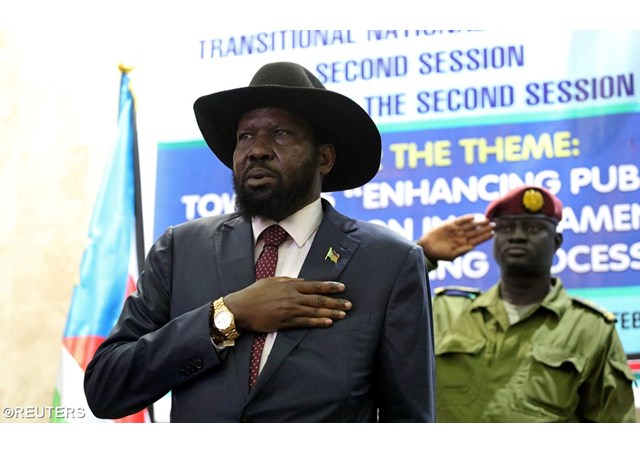
Famine: South Sudan President promises safe access for aid

As Pope Francis appealed Wednesday to the international community to come to the aid of South Sudan, United Nations’ (UN) aid agencies point to war and a collapsing economy as the main causes of the famine in South Sudan.
The news agency, AP, reported Tuesday that South Sudan's President Salva Kiir promised that his government would ensure “unimpeded access” for all aid organisations, a day after famine was declared for more than 100,000 people in the country’s Unity state.
The United Nations and others have long accused the government of blocking or restricting aid delivery in the East African nation.
President Salva Kiir's remarks to the transitional national assembly came after the famine was declared in parts of oil-rich Unity state. More than 100,000 people are affected, according to South Sudan's government and UN agencies. They say another 1 million people are on the brink of starvation.
South Sudan has repeatedly promised to allow full humanitarian access across the country, but with little effect. Some in Kiir's government have expressed hostility toward the international community, accusing it of meddling in the country's affairs.
The U.S. State Department said it was gravely concerned by the declaration of famine, calling the crisis “the direct consequence of a conflict prolonged by South Sudanese leaders who are unwilling to put aside political ambitions for the good of their people.”
“We call on President Kiir to expeditiously make good on his promise that humanitarian and developmental organisations will have unimpeded access to populations in need across the country,” acting State Department spokesman Mark Toner said in a statement.
Also Tuesday, the European Commission announced an 82 million euro (U.S.$ 87 million) emergency aid package for South Sudan, saying this is the first famine is declared in the country since it gained independence from Sudan in 2011.
Tens of thousands have died in the civil war that began in December 2013 and has continued despite a peace agreement in 2015. More than 1.5 million people have fled the country.
South Sudan is also experiencing severe inflation, which has made food unaffordable for many families.
In the meantime, the UN refugee agency UNHCR was reported by the agencies as saying it is concerned about the current refugee crisis in Uganda, describing it as the largest refugee crisis in Africa.
This follows the displacement of thousands of South Sudanese refugees, who have
been forced to flee their country due to the ongoing conflict.
this is according to Jesse Kamstra, representative of the Lutheran World Federation
in Uganda,
“This is currently the largest refugee crisis in Africa and the third largest in the world, and there is complete lack of international attention on this crisis that is unfolding and I don’t know how many more thousands have to come and flee or die before the international community wakes up and realises what is happening here on the ground,” Kamstra said.
Just last week, the UN agency said more than 1.5 million asylum seekers had taken refuge in Uganda, since the civil war that erupted in South Sudan in December 2013. Uganda's capacity to host the refugees has been severly stretched.
The International Federation of the Red Cross says 11 million people in Kenya, Somalia and Ethiopia also need help as a result of the drought that has hit Eastern Africa.
(Sources: Vatican Radio, AP, Reuters, Africanews)
| All the contents on this site are copyrighted ©. |


